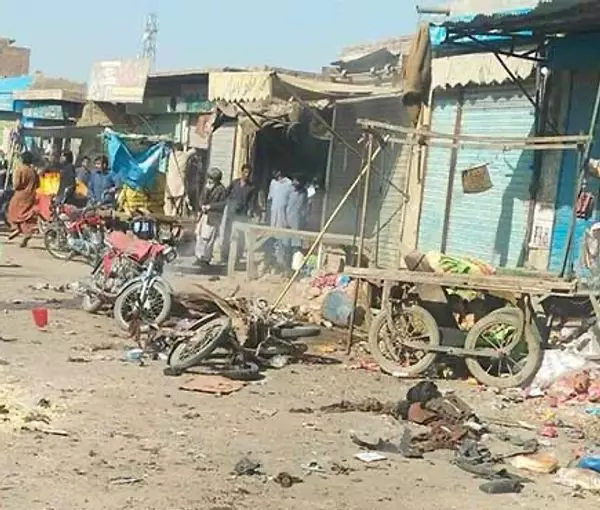In a perpetual storm
Owing to a lack of effort by the government and the rising influence of the TTP, terror in Pakistan has rendered its political and security situations vulnerable

In the last month, two deadly terror attacks, one in Peshawar and the other in Karachi, have unsettled the Pakistan security establishment causing immense embarrassment to the government for its glaring failure to stop the cases of rising terror. Incidentally, both happenings have not only hit but hit rather hard at the Police architecture. While the Peshawar attack claimed more than a hundred lives, Karachi casualties were relatively less. Yet, it left a huge negative impact in Pakistan leading to a deep sense of insecurity among the people, security agencies and the army. In the meantime, at least five people lost their lives in the most recent dastardly terror attack (February 26) through an Improvised Explosive Device (IED) in Barkhan in Balochistan. Once again, marred by the repeated attacks, the government and the law and order authorities have vowed to tone up the Counter Terror (CT) measures but on the ground, there is nothing happening to instil confidence amongst the people. Also, in another separate incident, two police officers were killed (February 25) when a magnetic bomb attached to their vehicle went off in Baluchistan’s’ Khuzdar district.
Dwelling upon the nuts and bolts of the audacious incidents, the immediate implications of these terror attacks have drawn wide scale criticism from all. People now demand answers and protection from the government as the lives of innocents are severely endangered. Even the all-powerful ISI is put on the defensive. To bolster the morale of the battered police force, following the Karachi attack, the Chief of the Army Staff (COAS), Gen Asim Munir, paid a visit to the Karachi hospital to see the wounded police personnel and Rangers. Intelligence officials in total anonymity, do not rule out more such attacks in the near foreseeable future hitting out at other high-value targets based out of Islamabad, Rawalpindi, Quetta, Lahore and other places of strategic significance.
Politicians, meanwhile, have started trading charges and countercharges questioning the competence of the government and the security agencies. They alleged glaring complacency in the government’s anti-terror plans and more specifically, in dealing with the TTP, which has already claimed responsibility for triggering the twin terror assaults in Peshawar and Karachi.
For example, Shireen Mazari, a leading member of the Pakistan Tehreek-e-Insaaf (PTI) has recently charged that the then COAS, Gen Qamar Ahmed Bajwa wanted resettlement of Tehreek-e-Taliban Pakistan (TTP) families soon after the Taliban takeover of Kabul in August 2021. PTI being the main political adversary of the present government, is exploiting the fresh terror raid at Karachi to put the incumbent regime on the backfoot apparently to settle political scores. It has joined hands with the media, intelligentsia and all who have started vehemently criticizing the government and the agencies for the nonstop terror acts making the vulnerability of common people much higher than before.
According to the United States Institute of Peace (USIP), reacting to TTP’s ongoing terror attacks, Afghan Taliban will not withdraw their support to TTP as Pakistan may not be able to launch any military offensive due to the prevailing economic meltdown. It also gives out that amid Pakistan’s economic crisis and the Taliban’s rule in Afghanistan, the Pakistani Taliban have reemerged as an increasingly potent threat. The USIP report further says that the declining economic situation has put limits on Pakistan’s military options. Pakistan can carry out raids and undertake defensive actions only inside the country, but it doesn’t have the resources for a sustained high-intensity campaign.
According to analysts in Pakistan on the political front, the Pakistan Democratic Movement (PDM) government seems to have not learnt any lesson from the past and is resorting to the same old methods of suppressing the opposition. The resignation of the National Accountability Bureau (NAB) Chairman for doing “certain things” that were unacceptable gives credence to allegations that the government is trying to use the anti-corruption watchdog to silence its opponents.
The recent crises including the terror assaults have shaken the entire edifice. The political stand-off due to ongoing political machinations in the provinces of Khyber Pakhtunkhwa (KP) and Punjab has brought the country closer to anarchy. Political confrontation and polarization have weakened the state institutions and created more space for extra-constitutional powers to act. These are observations of leading columnists. According to many, it is one of the most serious crises that the country has encountered in its turbulent political history. As per writer Zahid Hussain, there is a need for political reconciliation. Instead of trying to use extra-legal means to perpetuate its rule, the PDM government should try to defuse the deepening political polarization. Escaping from the elections is not a solution to the problems that the country is facing.
A terror-stricken Pakistan has to unshackle itself from the grip of terror or at least it should display its sincerity in doing so for the confidence of its own people in particular and the universal community in general. Sadly, it is not seen to be doing so. Efforts, if any, are largely invisible. The political developments, as elaborated above, need to be factored in all earnest.
The writer is an IPS officer, Adviser NatStrat, security analyst and a former National Security Advisor in Mauritius. Views expressed are personal



